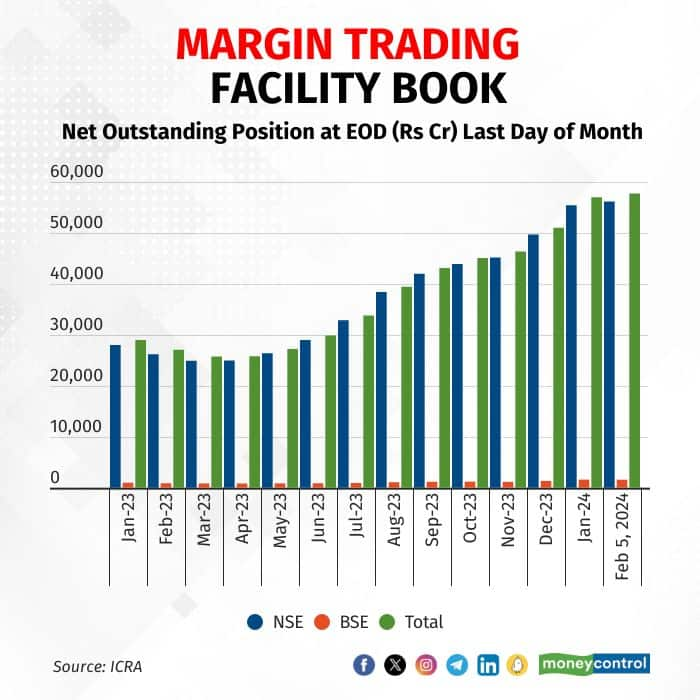Brokers hike margins on BNPL facility; Paytm, Zee meltdown, polls cited as key reasons


India VIX, a measure of the market’s volatility expectations over the near term, has surged over 18 percent in the past month. In fact, over the last 21 trading sessions, the Nifty 50 has closed 10 days in the green and 10 days in the red, with no strong directional move in the year to date.
Several domestic broking firms have increased margins on the MTF (margin trading facility), also known as the BNPL (buy now, pay later) service, amid a spike in volatility in equity markets. Apart from the upcoming elections, sharp stock-specific falls have also prompted brokers to take this step, industry insiders told Moneycontrol.
MTF is an arrangement where investors borrow funds from brokers to purchase stocks. For instance, a client pays only Rs 25, but can buy stocks worth Rs 100. It is a product for the cash segment, and brokers charge anywhere between 7 percent and 21 percent on the borrowed funds.
Over the past week, IIFL Securities, ICICI Direct, Angel One, 5Paisa and Samco Securities have all increased margins on the MTF facility, said market participants.
Also Read: Margin Call: Additional fund requirement might have fuelled the fall in Paytm stock
Moneycontrol has viewed client communications issued by IIFL Securities and 5Paisa. In the case of IIFL, the revised margin for acquiring a new MTF position was doubled from the earlier requirement. This was made effective from February 5.
On the other hand, Dhan has temporarily paused all fresh MTF buying. This was done due to expectations that market volatility would be high due to geopolitical tensions and upcoming elections, the company said on its X handle.
Angel One, Samco and ICICI Direct are yet to respond to our email queries.
Not all brokers offer this feature. India’s biggest brokers Zerodha and Groww do not offer MTF.
Story continues below Advertisement

Stock-specific crashes
January saw three big stock crashes, which contributed to overall market volatility. Polycab’s share price crashed 30 percent in two days on concerns of unaccounted cash sales after income tax raids. Paytm fell 40 percent when the RBI put curbs on its payments bank. Similarly, Zee fell 33 percent when its merger with Sony was called off.
“With MTF, the biggest risk we carry is the liquidity risk in some stocks,” said Dhiraj Relli, managing director and chief executive officer, HDFC Securities.
When there are sudden falls, margin calls go out to clients. If they cannot cough up the additional funds, the position will either be squared off or collateral is sold.
“Further margin calls from brokers in case of correction in such counters leads to a cascading effect,” Shrey Jain of SAS Online told Moneycontrol.
Also Read: Paytm to acquire ONDC startup Bitsila amid payments bank crisis
Rise in market volatility
India VIX, a measure of the market’s volatility expectations over the near term, has surged over 18 percent in the past month. In fact, over the last 20 trading sessions, the Nifty 50 has closed 10 days in the green and 10 days in the red, with no strong directional move in the year to date.
“Given where markets currently are, brokers feel valuations are stretched, especially in the mid and small cap space. Traditionally, when volatility increases, stocks in this space are susceptible to sharp corrections,” Jain added. SAS Online also offers the MTF facility but has not increased margins yet.
Stretched MTF book to moderate demand?
Ajay Kejriwal of Choice Group said that some brokers might also be increasing margins as the cost of borrowing has increased. NBFCs are now lending at higher rates to brokers because banks have reduced their NBFC exposure.
Meanwhile, Relli believes that some brokers might have exhausted their borrowing limits, “though for bank-based brokers like us, borrowings and pricing may not be a big constraint”.
Also Read: Rush for financials: Domestic institutions sit on Rs 1.41-trillion headroom to buy bank stakes
MTF exposure has grown leaps and bounds over the past few years. The current MTF outstanding position is at Rs 57,744 crore against Rs 27,057 crore last February.
“There are regulatory limits on capital market exposure at the group level, which can be another factor that can curtail growth. In addition, the increase in short-term borrowing rates could also drive up the MTF rate charged by brokers, which can moderate demand,” said Deep Inder Singh, Vice President, ICRA.









